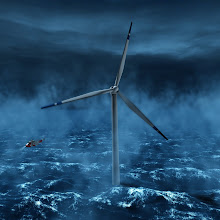When reading my blog posts, people may assume that I am already an expert on renewable energy, given my presentation of obscure facts on the subject. On the contrary, I recently discovered those facts, which significantly altered my views and thoughts on renewable energy. Before my discoveries, I considered renewable energy to be, currently, extremely viable and only halted by political gridlock. Now, however, I am stunned by the multitude of environmental obstacles, which I discussed in earlier blog posts, that hinder the development of renewable energy technologies. Because of my recent discoveries, I now realize the enormous difficulties in advancing renewable energy.
To fully understand myself, I needed to compare my evolution in thought on renewable energy to recent announcements and news on the topic. For instance, many organizations have announced plans in relation to renewable energy. Gemma Renewable Power LLC can pursue a $50 million wind farm contract, BlueFire Ethanol will be presenting its patented process for converting cellulosic wastes to ethanol, and HelioVolt opened its first factory in Austin, Texas for producing thin-film solar material. Their work on renewable energy reminded me of my earlier desire to have companies pursue renewable energy relentlessly, and these companies were not the only reminders. In fact, the country of Thailand is considering using ethanol and natural gas instead of imported oil, and Hawaii plans to have seventy percent of its energy consumption met with renewable energy by 2030. Granted, these plans may be changed or scrapped completely, but they both show the intense desire many people, including myself, possess for renewable energy.
I would like to see companies expand renewable energy technologies, but, regrettably, I have seen many drawbacks to transitioning to current renewable energy technology. I have elaborated on these drawbacks in previous blog posts, but I have also seen one additional setback - the current economic crisis. As many of you know, using renewable energy reduces the usage of fossil fuels, which give off greenhouse gases that heat the atmosphere. A popular mechanism of reducing these gases is called cap-and-trade, where the government would, basically, create a market for carbon dioxide emissions. The creation of such a system, however, could further stress the economy. Because of both the economic crisis and the environmental side effects current renewable energy technologies have, I slowly realized the difficulties in implementing renewable energy. My conclusion was reinforced by the fact that one company has cut funding for a solar rooftop project in half.
Given my discoveries, I thought that the world could, currently, do little about energy until the economic crisis passed, but I quickly found that my assumption was untrue. Recently, Oregon has passed greenhouse gas reporting rules, which require that, in 2010, all major greenhouse gas producers must report their emission totals. This rule seemed to be useless, but, upon further examination, I saw that data on greenhouse gas emissions may help scientists to gather more data on global warming, which could encourage more legislation on global warming. I also noticed that even filmmakers were taking action by creating "Eco-Horror" films that discuss global warming. Finally, I found that twenty-one companies will seek permission for the construction of thirty-four nuclear power plants. Upon seeing and contemplating this material, I concluded that those actions signified that the industry was attempting to lay additional groundwork for future expansion of renewable energy, which may prove important for the future.
My thoughts and conclusions, no matter how reinforced they may be, are not concrete or absolute. Later on, economic conditions may change, or scientists may invent groundbreaking new technologies that resolve some drawbacks to renewable energy. Those developments probably would alter my present conclusions on renewable energy, and would likely change political and scientific views on the topic. Your views, however, are also extremely important. By educating yourself on renewable energy, you will develop a greater understanding of the subject, allowing you to make an informed decision on Election Day and reshape America. Most importantly, you may find that your thoughts on renewable energy evolved, just as my thoughts on that subject evolved.
Saturday, October 25, 2008
Subscribe to:
Post Comments (Atom)


4 comments:
Thomas,
I like how even though most economies are facing a major crisis that people are still going forward with pursuing renewable energies. I agree that at first it will be more costly and put more of a stress on people to pay for these renewable resources. I still believe that these resources will begin to get cheaper once there is more money is invested into their development and that the long term effects can only be beneficial. Do you have an idea when we will be able to break this boundary?
Thanks,
Robert
IGetNoSleep,
Renewable resources may get cheaper over time, and the long term effects may indeed be beneficial. I do not know, though, when the world will break the renewable energy boundary. Future events are unpredictable, and those events may alter my perceptions on renewable energy.
Tommy
Thomas,
I have to agree with igetnosleep when he said that it is good that people are still seeking ways to transition into having renewable energy. I guess I'll try to connect our blogs: Do you think that more immigrants could boost our economy and help gets us back on track to gain renewable energy?
duckblogger
Duckblogger,
Additional immigrants within the United States may or may not boost the economy. Without available jobs, new immigrants could not work, thereby becoming another burden for the government. Of course, if those new immigrants indirectly influence the government to create more jobs, then immigrants may help the economy. On renewable energy, pursuing that goal will require both scientists and construction workers to research and install new technologies, respectively. Working on renewable energy certainly requires those job types, and immigrants could easily play the role of construction workers. If immigrants wanted to be scientists, though, then they should be allowed to pursue a fulfilling education. This method may resolve this issue for now, but the results can vary widely, given the multiple factors involved, and America may not use this method at all because of that risk.
Tommy
Post a Comment